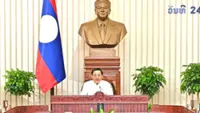KINSHASA: Amnesty International says that the expansion of industrial copper and cobalt mines in mineral-rich Democratic Republic of Congo (DRC) has led to forced evictions and a litany of rights abuses.
The central African nation has the world’s largest reserves of cobalt, a metal viewed as vital for the renewable-energy transition because of its use in electric vehicle batteries.
Already a subscriber? Log in
Get 20% OFF The Star Digital Access
Cancel anytime. Ad-free. Unlimited access with perks.





